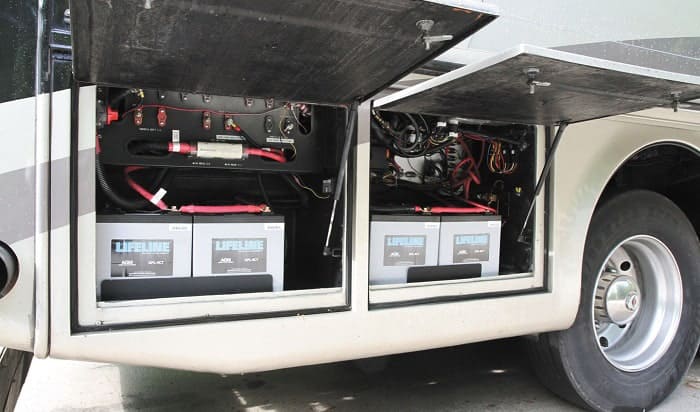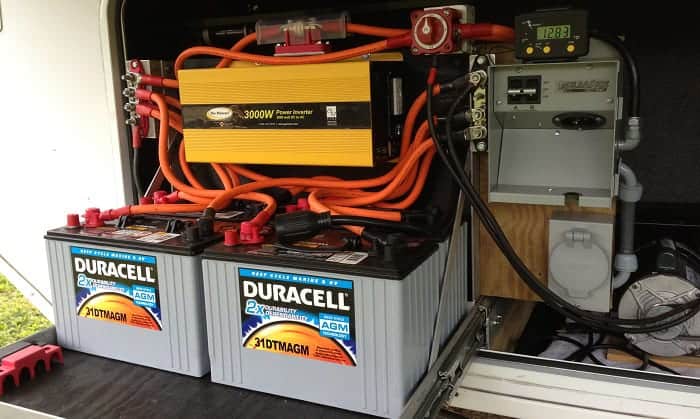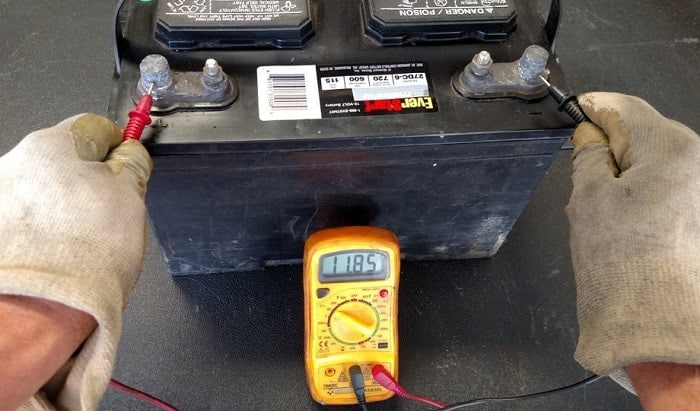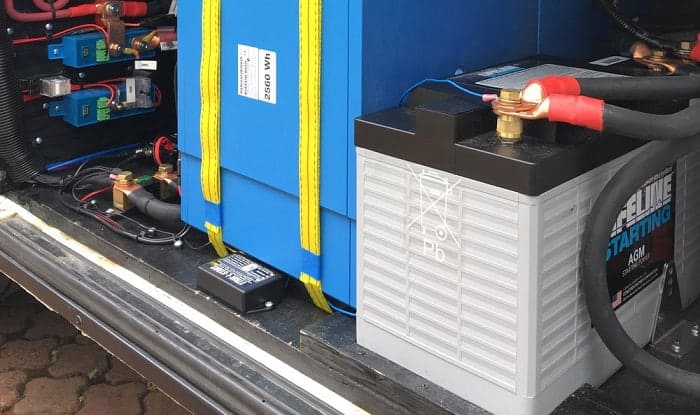Are you looking for a reliable source of electricity for your RV? Do batteries with different voltages confuse you? If yes, then read along to discover more about 6V vs. 12V RV batteries to ensure which one would better serve your motorhome. Picking out the right set of RV Batteries is crucial because they will power your appliances, gadgets, and air conditioners when you are on the road.
Table of Contents
Various Types of Batteries for Your RV
It will help if you have a 12V battery line-up to power your RV’s appliances, which can be provided by lead-acid, AGM, and Gel batteries. Lead-acid variants are the most popular as they will not burn a hole in your pocket. Then again, you have to be on your toes to ensure the water levels of Lead-acid batteries else, they will stop working.
To avoid the cost of changing batteries, top up the battery with distilled water after an interval of two weeks to a month. The intensity of use determines the maintenance. If you use the battery for water heaters, central heating, and air conditioning, you should opt for a monthly approach.
Since Lead-acid batteries release a lot of hydrogen when used, it is better to install them outside the van as hydrogen is quite flammable. If you are planning to park the RV for the season, make sure that you store the batteries vertically.
Even though you will have to invest more in AGM and Gel batteries, these variants do not require much maintenance once installed. Moreover, there is no particular manner in which you need to store these batteries. You can install them horizontally, vertically, or whatever way the space in your RV permits you to.
Apart from being expensive, low availability is another downside of AGM and Gel batteries. If you are in a remote village with your RV, there are little chances that you will find one of these in the local hardware stores if you need them immediately.
6v vs 12v RV Batteries
Essentially, a battery is a combination of cells that are loaded with chemicals to facilitate ion exchange. The back and forth movement of positive and negative ions produce electricity. Each cell has a capacity of 2 volts, requiring three cells for 6V battery and six cells for 12V battery.
In theory, the 6V and 12V batteries might sound similar because, at the end of the day, you require 12v of power, which can be achieved from both. Then again, when you take a closer look at your RV situation, you will begin to discover the weight it can handle and the cost you are willing to bear.
In case the weight and budget are no issues, you should opt for 12V batteries.
Voltage
Voltage is the energy that powers the electricity to reach your appliances and devices. There are plates in the battery that facilitate the movement of electrons. If the voltage is high, the push of electrons will be higher, generating more electricity.
Current
Voltage is the force that facilitates the movement of electrons, and the current is the movement that causes the generation of electricity. It flows through the wires and is measured in amperes.
While voltage is the strength of electricity, you also need ampere-hours to determine for how long the battery will function. The ampere-hours and voltage are higher in 12V batteries as compared to 6V batteries.
Charging
If you have two 6V batteries and are considering using them in a circuit to create a 12V battery, you might regret it later. When you start charging the battery, you can only charge them up to the battery capacity with the least ampere-hour. So, when two batteries of 6V each are connected, their combined voltage remains 6V.
To deal with this issue, you can try connecting them in a parallel circuit. Now, even though the voltage of the battery will remain 6V, the ampere-hour capacity will add on to the batteries’ sum capacity. In this way, the batteries will be charged to their full capacities when plugged in.
Lifespan
When dealing with batteries for your RV, longevity is one aspect you cannot ignore. Here, 6V batteries win the bet because they come with heavier plates. They are more long-lasting than 12V batteries even when you use them for deep charge/discharge cycles. In such cases, 6V batteries can last from 4 to 8 years, which is astonishing.
Weight
The 6V batteries weight much less than the 12V batteries. Even an individual can handle the 6V variants without any assistance. When you have to travel miles in your RV, it is vital to save weight on it as much as possible so that the wheels and axel are in good shape. Hence, the lighter 6V batteries are a better idea.
Which Batteries Should You Use
12V Batteries in a Parallel Circuit
Most RVs use this kind of configuration with two jumper cables in order to connect positive charge with a positive charge and a negative charge with a negative charge. The RV wires are then attached to both the ends.
The ampere-hour rating of most 12V batteries is 7 Ah, which can be converted into 140Ah by connecting 2 of these. This will also ensure that 12V of push is maintained as the current escalates.
Advantages of the usage of 12V batteries in parallel
- Since the voltage remains 12V, you will not experience unnecessary voltage drops even if the charge drops below 50%. This will ensure that your appliances remain in great shape for longer.
- The parallel series will ensure that the ampere-hours of the battery are doubled. So, you get double the charge to steal that extra time for running your entertainment unit in your RV.
- You will be surprised to discover that the low voltage 6V batteries are, in fact, cheaper than 12V batteries because they do not last as long as the 6V batteries. Hence, most RVs prefer 12V batteries.
- 12V batteries are more easily available across even the smallest counties. So, you do not have to worry about damaged batteries when you are in remote locations.
Disadvantages of using 12V parallel battery
- Although you can double the amp-hour of 12V batteries by connecting them in parallel, it is still much less than what is offered by 6V batteries.
- You might face trouble if the battery gets entirely discharged with 12V batteries. In comparison, 6V batteries recover faster.
6V Batteries in a Series
Even though 12V batteries are quite popular amongst RV dealers, once they gain more experience on the road, they prefer two 6V batteries. Instead of connecting them parallel, they connect them in a series to get a voltage of 12 V to ensure all your appliances get power.
Advantages of 6V batteries in a series
- Once fully charged, the Ah capacity of 6V batteries is much higher than 12V batteries.
- These batteries do not wear out easily. So you can discharge and then recharge them more often as compared to 12V batteries. Even the charge memory doesn’t affect them much.
- 6V batteries, with good maintenance, can last you a good 4-8 years, which is great for your pockets.
Disadvantages of 6V batteries in a series
- The 6V version of batteries can be slightly more expensive than 12V batteries. So, if you are tight on budget, try considering 12V variants.
- The dimensions of 6V batteries differ from regular 12V batteries, as the former is taller. You might have to install a separate battery box for them as most RVs are equipped with battery boxes for 12V batteries. The Camco Heavy Duty box is a great call in this case.
- Only the large automotive supply stores have these batteries. You cannot find them in remote locations easily.
Final Thoughts
To conclude, if your RV comes with 12V batteries, you can roll along with them. However, one cannot argue that 6V batteries have more advantages that outweigh those of 12V batteries. Here is what you can do:
- Switch to 6V batteries as soon as the old ones wear out.
- Never let your batteries discharge below 50% as it diminishes the quantity of charge that they hold.
- Stock up the RV with a couple of 6V batteries if you are heading to a fairly remote location.

Hi, I am Tom Hank, an RV-er since 2014. Back then, I started without much help. As you can imagine, the struggles are endless. But now, you do not have to begin your adventures knowing next to nothing about RV lives.





